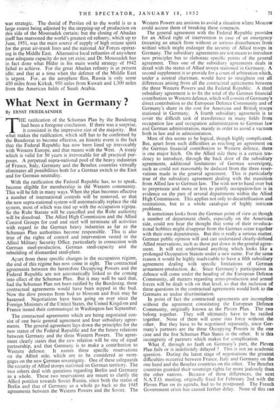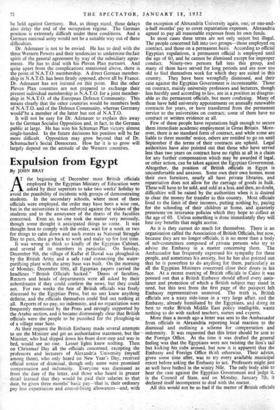What Next in Germany ?
By ERNSTFRIEDLAENDER
THE ratification of the Schuman Plan by the Bundestag had- been a foregone conclusion. If there was a surprise, it consisted in the impressive size of the majority. But what makes the ratification, which still has to be confirmed by the Bundesrat to become effective, an historic event is the fact that the Federal Republic has now been lined up irrevocably with Western Europe, and that means with the West. A treaty which is valid for 50 years is irrevocable for all practical pur- poses. A perpetual supra-national pool of the heavy industries of France, Italy, Germany and the Benelux countries virtually eliminates all possibilities both for a German switch to the East and for German neutrality.
With the ratification the Federal Republic has, so to speak, become eligible for membership in the Western community. This will be felt in many ways. When the plan becomes effective a number of international controls will be removed, so that the new supra-national system will automatically replace the old system, most of which was tied up with the occupation regiipe. So the Ruhr Statute will be cancelled and the Ruhr authority will be dissolved. The Allied High Commission and the Allied Control Groups for coal and steel will terminate all activities with regard to the German heavy industries as far as the Schuman Plan authorities become responsible. - This is also true of the rights of control and intervention vested in the Allied Military Security Office, particularly in connection with German steel-production, German steel-capacity and the rebuilding of dismantled steel-plant.
Apart from these specific changes in the occupation regime, the end of this regime has now come in sight. The contractual agreements between the heretofore Occupying Powers and the Federal Republic are not automatically linked to the coming into effect of the Schuman Plan. But it may well be said that, had the Schuman Plan not been ratified by the Bundestag, these contractual agreements would have been nipped in the bud. Now the slow process from bud to blossom and fruit may be hastened. Negotiations have been going on ever since the Foreign Ministers of the United States, the United Kingdom and France issued their communiqué in Washington last September.
The contractual agreements which are being negotiated con- sist of one basic general agreement and four subsidiary agree- ments. The general agreement lays down the principles for the new status of the Federal Republic and for the future relations between Germany and the three Western Powers. The agree- ment clearly states that the new relation will be one of equal partnership, and that Germany is to make a contribution to Western defence. It names three specific reservations on the Allied side, which are to be considered as mort- gages on the new Merman sovereignty. One of these safeguards the security of Allied troops stationed on German territory. The two others deal with questions regarding Berlin and Germany as a whole. These two reservations are meant to clarify the Allied position towards Soviet Russia, since both the status of Berlin and' that of Germany as a whole go back to the 1945 agreements between the Western Powers and the Soviet. The Western Powers are anxious to avoid a situation where Moscow could accuse them of breaking these compacts.
The general agreement with the Federal Republic provides for an Allied, right of intervention in case of an emergency (meaning an attack from without or serious disturbances from within) which might endanger the security of Allied troops in Germany. The subsidiary agreements are not meant to introduce new principles but to elaborate specific points of the general agreement. Thus one of the subsidiary agreements deals in detail with the status of Allied troops stationed in Germany. A second supplement is to provide for a court of arbitration which, under a neutral chairman, would have to straighten out all differences arising from all the contractual agreements between the three Western Powers and the Federal Republic. A third subsidiary agreement is to fix the total of the German financial contribution to Western defence, which will consist of Germany's direct contribution to the European Defence Community and of Germany's share in the cost for American and British troops stationed in Germany. A fourth subsidiary agreement is to cover the difficult task of transference in many fields from occupation law and occupation administration to German law and German administration, mainly in order to avoid a vacuum both in law and in administration.
Most of this seems to be logical, thqugh highly complicated. But, apart from such difficulties as reaching an agreement on the German financial contribution to Western defence, there is one major hitch. On the Allied side there is a certain ten- dency to introduce, through the back door of the subsidiary agreements, additional limitations of German sovereignty, such as could not reasonably be deduced from the three reser- vations made in the general agreement. This is particularly true of the subsidiary agreement _dealing with the transition from Allied law to German law. The wish not to hand over but to perpetuate and more or less to petrify occupation-law is in evidence on the part of several departments within the Allied High Commission. This applies not only to decartellisation and restitutions, but to a whole catalogue of highly intricate problems.
It sometimes looks from the German point of view as though a number of department chiefs, especially on the American side, could not bear the thought that some of their re-educa- tional hobbies might disappear from the German scene together with their own departments. But this is really a serious matter. German public opinion will and can understand clearly-defined Allied reservations, such as those put down in the general agree- ment. It will not understand anything which looks like a prolonged Occupation Statute under a new name. For the same reason it would be highly inadvisable to have a fifth subsidiary agreement dealing with specific limitations of German armament-production, &c. Since Germany's participation in defence will come under the heading of the European Defence Community, all matters regarding arms-production and armed forces will be dealt with on that level, so that the inclusion of these questions in the contractual agreements would look to the Germans as undue discrimination.
In point of fact the contractual agreements are incomplete without the agreement constituting the European Defence Community, originally known as the Pleven Plan. The two belong together. They will ultimately have to be ratified together. None of them will come into force without the other. But they have to be negotiated separately, since Ger- many's partners are the three Occupying Powers in the one case and the five Schuman Plan States in the other. It is this incongruity of partners which makes for complication.
What if, through no fault on Germany's part, the Pleven Plan fails or is indefinitely delayed ? This is not an academic question. During the latest stage of negotiations the greatest difficulties occurred between France, Italy and Germany on the one hand and the Benelux countries on the other. The Benelux countries guarded their sovereign rights far more jealously than the other nations. Because of these differences, the next N.A.T.O. meeting, originally fixed for February 2nd with the Pleven Plan on its agenda, had to be postponed. The French Government crisis has caused further delay. None of this can be held against Germany. But, as things stand, these delays also delay the end of the occupation regime. The German position is extremely difficult under these conditions. And a German national army would not be a suitable way out of these difficulties.
Dr. Adenauer is not to be envied. He has to deal with the three Western Powers and their tendencies to undermine the fair spirit of the general agreement by way of the subsidiary agree- ments. He has to deal with his Pleven Plan partners. And quite apart from the complications mentioned above, there is the point of N.A.T.O. membership. A direct German member- ship in N.A.T.O. has been-firmly opposed, above all by France. Dr. Adenauer has not insisted on this point. But the other Pleven Plan countries are not prepared to exchange their present individual membership in N.A.T.O. for a joint member- ship in N.A.T.O. of the European Defence Community.. This means clearly that the other countries would be members both of N.A.T.O. and of the Defence Community, whereas Germany would'be a member of the latter but not of N.A.T.O.
It will not be easy for Dr. Adenauer to explain this away to the German Socialist Opposition and, in fact, to the German public at large. He has won his Schuman Plan victory almost single-handed. In the future decisions his position will be far more difficult. Opposition may grow beyond that of Dr. Schumacher's Social Democrats. How far it is to grow will largely depend on the attitude of the Western countries.



































 Previous page
Previous page